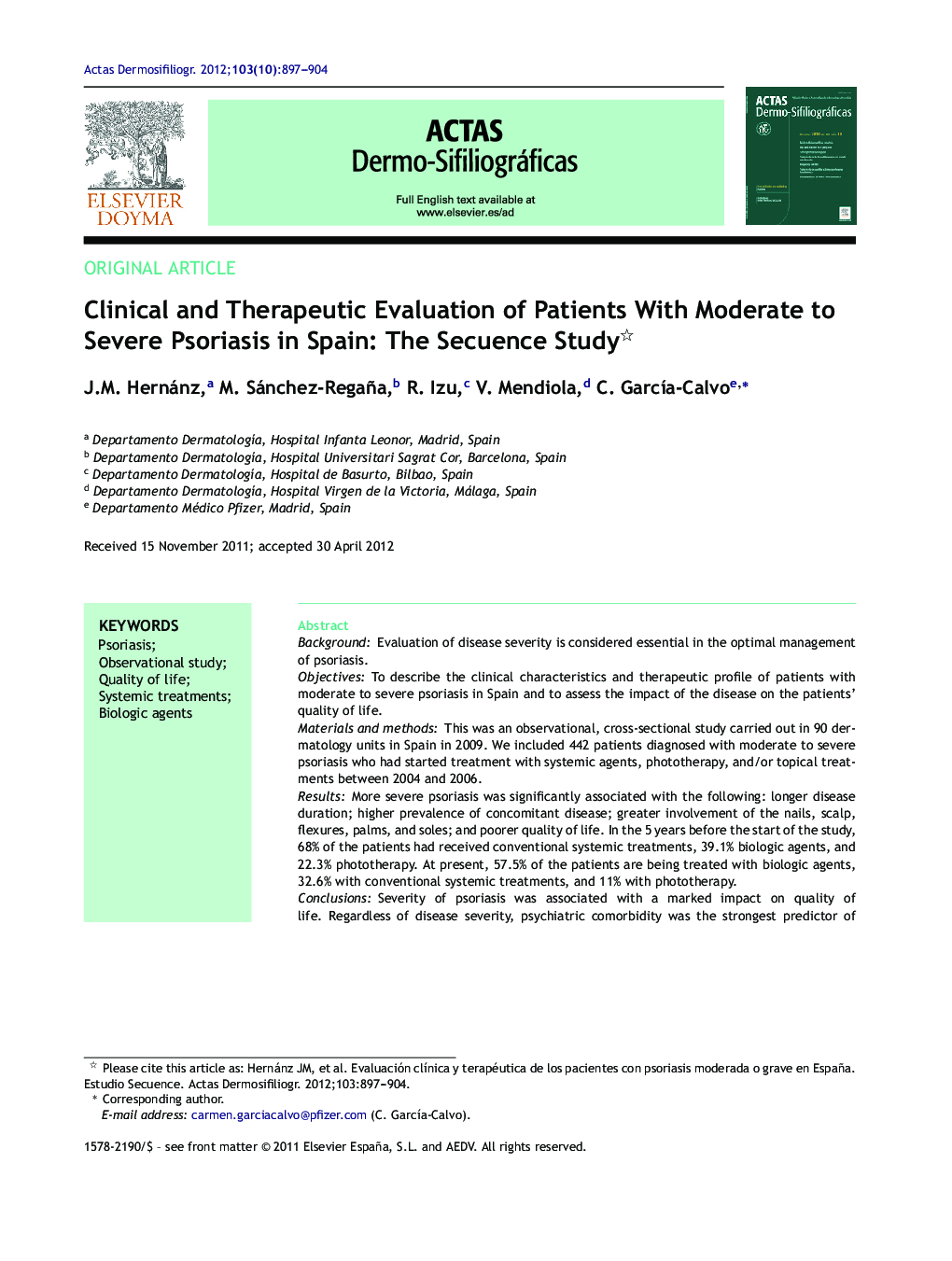| کد مقاله | کد نشریه | سال انتشار | مقاله انگلیسی | نسخه تمام متن |
|---|---|---|---|---|
| 3182461 | 1200655 | 2012 | 8 صفحه PDF | دانلود رایگان |

BackgroundEvaluation of disease severity is considered essential in the optimal management of psoriasis.ObjectivesTo describe the clinical characteristics and therapeutic profile of patients with moderate to severe psoriasis in Spain and to assess the impact of the disease on the patients’ quality of life.Materials and methodsThis was an observational, cross-sectional study carried out in 90 dermatology units in Spain in 2009. We included 442 patients diagnosed with moderate to severe psoriasis who had started treatment with systemic agents, phototherapy, and/or topical treatments between 2004 and 2006.ResultsMore severe psoriasis was significantly associated with the following: longer disease duration; higher prevalence of concomitant disease; greater involvement of the nails, scalp, flexures, palms, and soles; and poorer quality of life. In the 5 years before the start of the study, 68% of the patients had received conventional systemic treatments, 39.1% biologic agents, and 22.3% phototherapy. At present, 57.5% of the patients are being treated with biologic agents, 32.6% with conventional systemic treatments, and 11% with phototherapy.ConclusionsSeverity of psoriasis was associated with a marked impact on quality of life. Regardless of disease severity, psychiatric comorbidity was the strongest predictor of poor quality of life. On average, patients had received other treatments, such as conventional systemic treatments or phototherapy, for more than 2 years before switching to biologic agents for the first time.
ResumenIntroducciónLa evaluación de la gravedad de la psoriasis se considera esencial en el manejo terapéutico óptimo de los pacientes.ObjetivosDescripción de las características clínicas y perfil terapéutico de los pacientes con psoriasis moderada a grave en el ámbito español, evaluando su impacto en la calidad de vida de los pacientes.Material y métodosEstudio observacional, de corte transversal, realizado en 90 unidades dermatológicas en España en 2009. Se incluyeron 442 pacientes diagnosticados de psoriasis moderada a grave que habían iniciado tratamiento con fármacos sistémicos, fototerapia y/o tratamientos tópicos entre 2004 y 2006.ResultadosLos pacientes con psoriasis más grave presentaron de forma significativa un mayor tiempo de evolución de la enfermedad, mayor prevalencia de enfermedades concomitantes y mayor afectación ungueal, del cuero cabelludo, de las flexuras y de la zona palmo-plantar, así como peor calidad de vida. Durante los 5 años previos al inicio del estudio el 68% de los pacientes recibieron tratamientos sistémicos convencionales, el 39,1% fármacos biológicos y el 22,3% fototerapia. En la actualidad el 57,5% estaban siendo tratados con algún fármaco biológico, el 32,6% recibían fármacos sistémicos convencionales y el 11% fototerapia.ConclusionesLa gravedad de la psoriasis se asoció en nuestro estudio con una marcada afectación de la calidad de vida. Independientemente de la gravedad de la psoriasis, el mayor predictor de mala calidad de vida fue la comorbilidad psiquiátrica. El tiempo medio de permanencia en otros tratamientos, incluyendo sistémicos convencionales o fototerapia, hasta el cambio a un primer biológico fue superior a los 2 años.
Journal: Actas Dermo-Sifiliográficas (English Edition) - Volume 103, Issue 10, December 2012, Pages 897–904